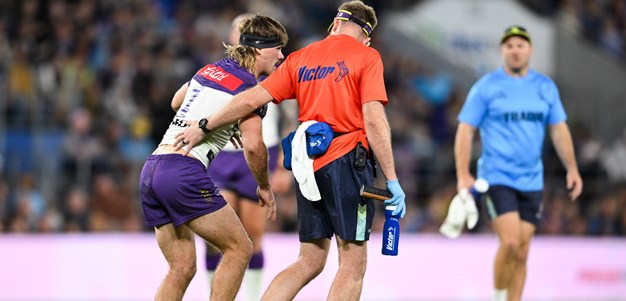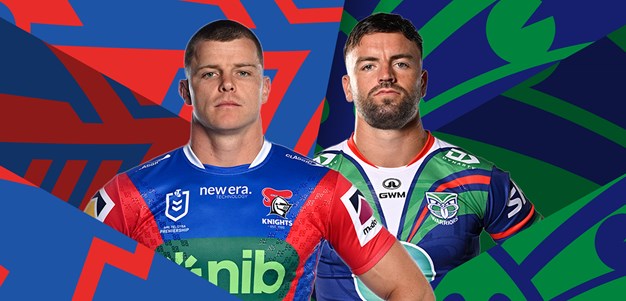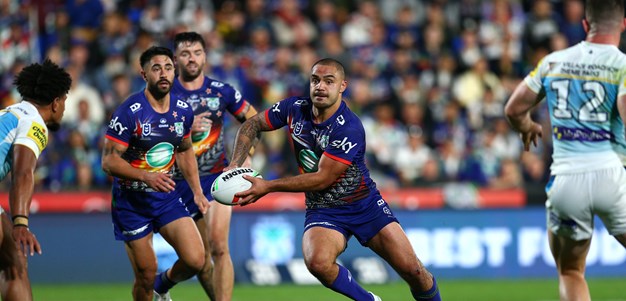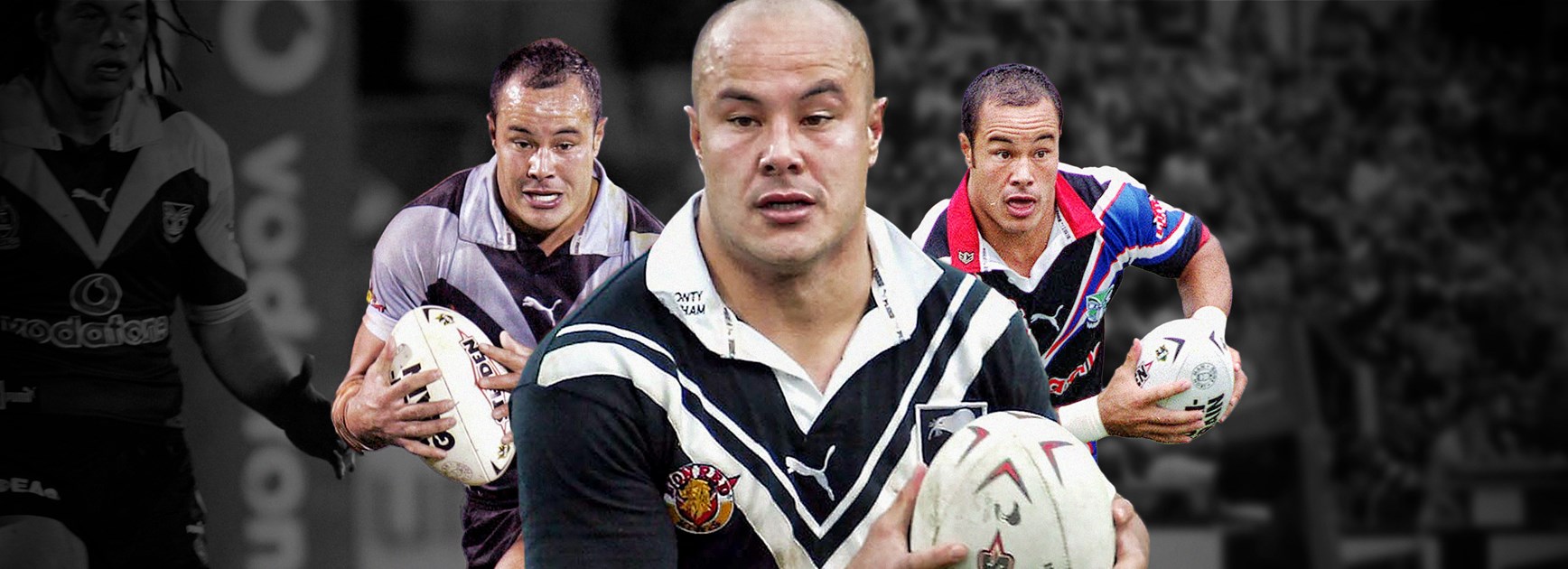
Few have displayed the tenacity and passion that Monty Betham showed during an impressive playing career.
His no-nonsense approach won over fans from all over the rugby league world. He played with, and against some of the game's great and retired a well-respected character.
All this from a karate champion who claims to have "peaked too early".
Legend Q&A
You are well known for what you achieved in rugby league and boxing, and your father Monty Betham snr was a champion boxer who fought the likes of Tony Mundine and is a Commonwealth Games medallist. But what were your passions when you were younger?
Growing up it was karate and I also wanted to be an All Black, as most kids in New Zealand did at that stage. They were heroes of our country, as they are now, but there was really no other sport and there was definitely no Warriors.
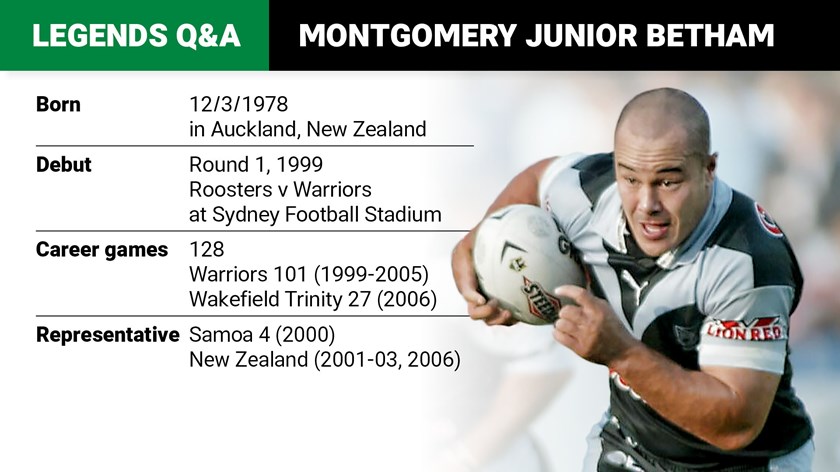
I used to look at my dad’s scrapbooks and he thought it would be nice to have his son follow in his footsteps but back then mum said, "no". She’d been through it all with my dad and couldn’t handle it again. I jumped into karate because my dad used to watch karate before his fights, he quite liked it and it got him a bit excited.
As a 16-year-old I won the New Zealand men’s karate championship and I only went in the open age group because I was playing on the Sunday in the Auckland grand final and I scored three tries. I still tell people I peaked too early.
When did you start playing league and how did you join the Warriors?
I used to frown on the game of rugby league until I played my first game. I had played rugby union and was 14 when I first got asked to play league, at the Mt Roskill club. From the moment I played that first game it just felt like home.
In under 15s I made the Auckland team and captained that, and then the schoolboy Kiwis. John Ackland put me on a scholarship with the Warriors in 1995.
There was huge excitement around the Warriors in 1995, it was glitz, it was glamorous, it was huge. That was when I started thinking this could be a career path.
Is it true that you ruptured your ACL but kept playing because you didn’t have a contract and feared your dream of an NRL career might end?
In 1998 I played reserve grade, I was the captain of the team and we played in the provincial competition up and down New Zealand. I did my ACL but they said you have a possibility of playing through without surgery so that’s what I did.
Then Mark Graham came to the club as coach and there was one night at training I tweaked my knee and it just swelled and puffed up.
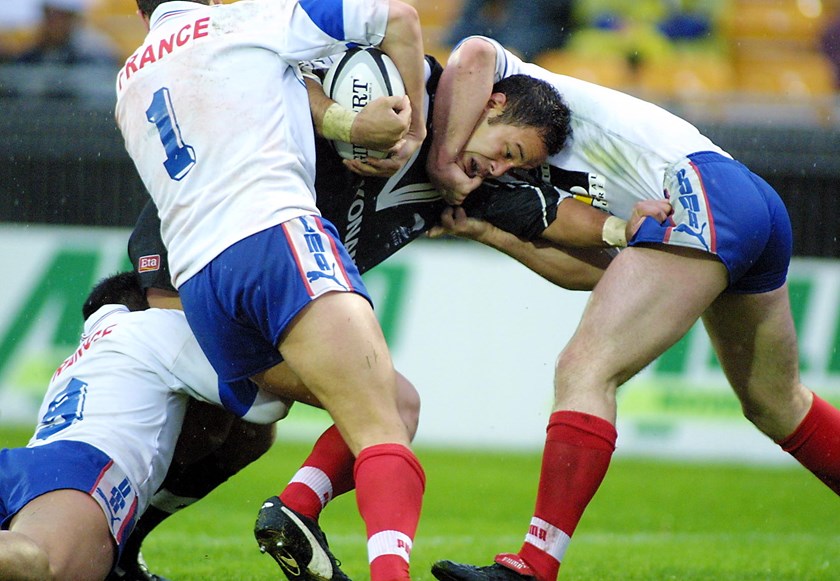
I didn’t have a contract at that stage because [previous coach] Frank Endacott had told me "I don’t want you here next year" so I had to prove to a new coach who was coming in that I could play on a knee that was still giving me a bit of grief. I played almost 18 months with no ACL in my left knee.
In the first trial match against the Melbourne Storm, Stacey Jones was sick so I played halfback. I injured my ankle and ended up coming off and Mark Graham said "sign him and fine him - sign him because he has done enough to prove how good he, but fine him because he didn’t strap his ankles and he got injured".
To go from Junior Kiwis captain, Junior Warriors captain and a protected player in Under 19s - so no one else could sign me - to be told that you are not wanted in the club next year and to have to prove myself to a new coach with no ACL, there were some hard times because I could see a career there but it could have been all be over in moments.
You made your NRL debut in 1999 against Sydney Roosters. What do you remember about that?
I came off the bench and debuted against the person I idolised, which was Freddy Fittler. Every lunchtime I used to want to be Freddy Fittler or Laurie Daley because I was a No.6 growing up so what do you do in your debut match? You punch your idol in the mouth.
My knee went in round three against the North Sydney Bears but before that I didn’t even think about it. I was rubbing shoulders with Matthew Ridge, Stacey Jones, Gene Ngamu and some of these heroes I’d watched for a long time.
While you had a contract, there were fears about the future of the club and Eric Watson took over as owner before the 2001 season, with Daniel Anderson as coach. How did you cope with that?
I was at the World Cup with Samoa and I talked to Daniel Anderson over there. Ando said there was a bit of my interest in me over there, I think [then Huddersfield coach] Tony Smith wanted me to stay, but he wanted me to come home and I said "I’m a Warrior". I was excited.
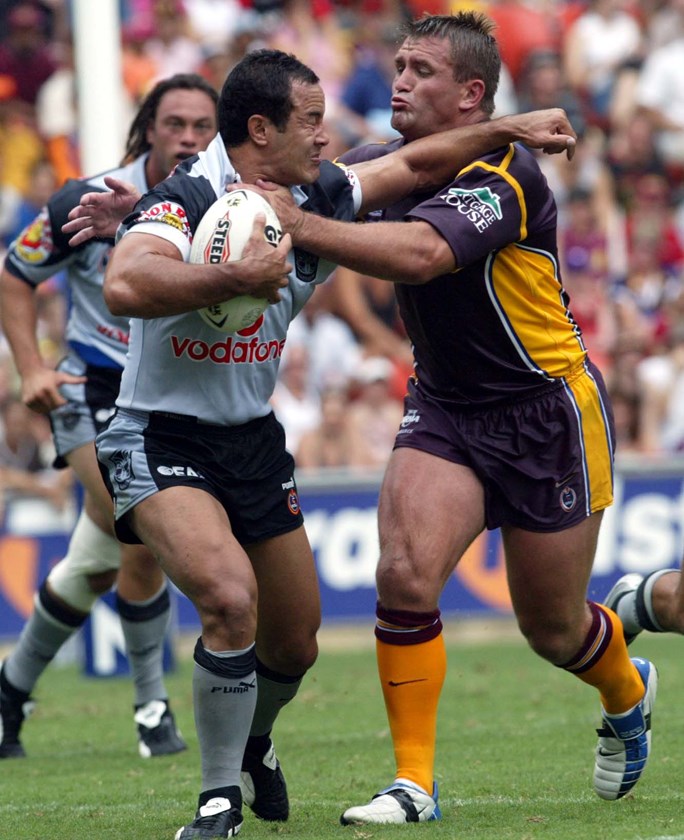
It was a totally different side, with a lot of young Kiwis. I think they had a bit of a fat brigade, or a group where they do extras, with the likes of Mark Tookey, Jerry Seu Seu and some other big guys.
Ando called me in and he said, "Monty, I want you to join them" but usually when you have got to train or do extras, that’s for the guys who are carrying a little bit so I pulled up my shirt. He said "what is that", and I said "that’s The Great Wall of Samoa". We had a bit of laugh.
You must have made an impression because Anderson made you captain in 2002 and it was announced at a Waitangi Day event with Prime Minister Helen Clark. That would have been a proud moment?
In 2001, when we made the play-offs for the first time, we had the co-captaincy of Kevin Campion and Stacey Jones but [CEO] Mick Watson and Matthew Ridge told me they wanted me to be captain the following year.
There was huge excitement around the Warriors in 1995, it was glitz, it was glamorous, it was huge
Betham on the arrival of the Warriors
I went away and didn’t think any more of it but then Mick phoned me and said "Daniel Anderson is going to ring you up soon and he is going to tell you that you are going to be the captain. You’ve got to act surprised".
We met at a cafe and even though I knew it was pretty amazing when Daniel told me. Then to have the announcement with Helen Clark there was pretty special because Helen Clark was a real leaguie back in the day. At that stage, I was the youngest Warriors captain at 24.
The Warriors made the grand final in 2002 and you were the captain but another knee injury ended your season early. How frustrating was that?
I did the right knee against Newcastle but I got back in position to come back and play. I was 18th man in the grand final and I was pushing the boys all the way. Daniel did what he thought was right and stuck with the team who had got there.
It was probably the right thing to do but I could have played and then I went on the Kiwis tour to Great Britain at the end of the season. I play more Tests for the Kiwis that year than I did NRL matches.
The Warriors made the finals for the first time in 2001, the grand final in 2002 and were just one win away in 2003. Do you look at that period as a missed opportunity for the club?
[Former Warriors team-mate] Sione Faumuina mentioned that when he went to the Broncos he spoke to Wayne Bennett and he said "what is going on over there, the Warriors should have won two or three premierships by now".
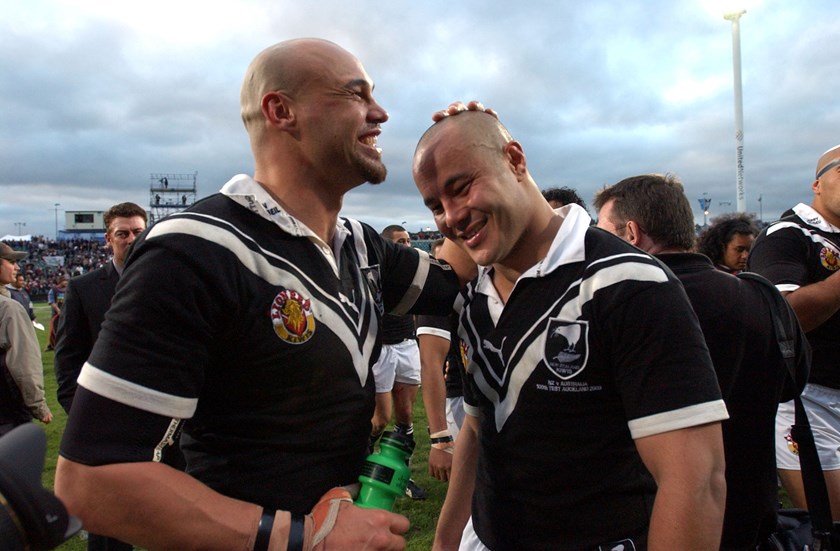
Hearing that really hurts me because I think in 2002 and 2003 we were in a really good position. In 2002, the Roosters, with their defensive line-speed, the numbers in tackles, the gang tackling and the players they had, were an amazing side but in 2003 we were one game off the grand final.
We lost to Penrith, who were a very good team, and they went on to beat the Roosters the following week. If Stacey wasn’t playing on one leg maybe we could done it.
You had a reputation as a hard man. How do you feel about that and do you think it undervalued how skilful you were as a lock or hooker?
I was a No.6 for growing up for the Junior Kiwis and the Junior Warriors but was I really a No.6? Probably not one that could kick and do a lot of other stuff but in terms of getting the best out of the players around me, being tenacious and combative, that’s what I was really good at. I was a good defender.
Then with those knee issues, I probably lost a bit of footwork so you have got to find how you contribute within a team with your skillset so I sort of fell into that role. That was the role that Mick Watson and Ridgey wanted me to play, which was that enforcer-type person.
When you fire up you get other people to fire up and it is a fine line. Sometimes you get it wrong but looking back at all the games I did have a fight or I fired up we didn’t lose any of those games.
But over here I copped a bit of flak for that and that’s understandable. Sometimes I wouldn’t even feel like firing up but I had to get the angry head on and look everyone in the eye because that was my role within the team.
It’s not about always firing up with your fists but just getting the best out of the people around you I used to love that camaraderie of physically getting over the top of the opposition and there is nothing better than a hard win like that.
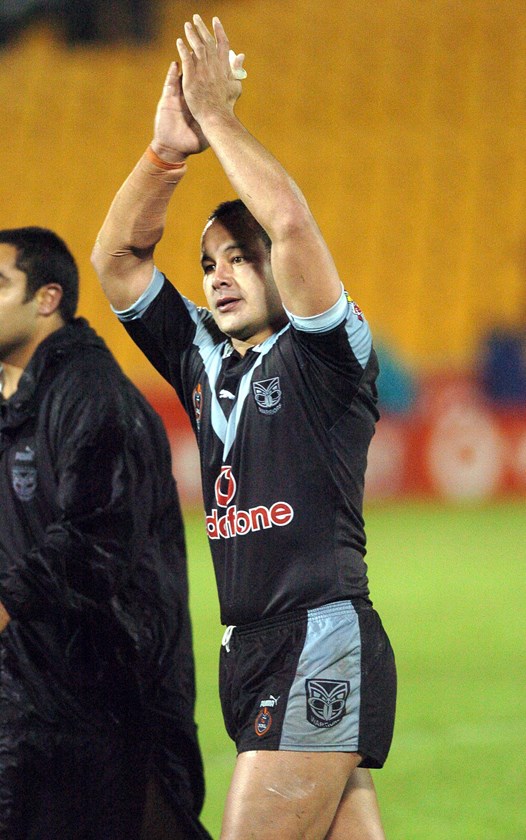
Was that criticism the reason you left the Warriors and finished your career in Super League?
I still had a year to run on my contract, I was still young and I had never ever thought about leaving the club. I always wanted to be a one-team player. When you are copping it like that, you think you can be thick-skinned but it is hard and when your other family gets effected it becomes harder.
Luckily I didn’t have kids at the time and I was lucky that there was no social media either because what you hear the players have to deal with now is worse.
I had a friend, David Solomona, who said come and play over at Wakefield, so I did. I had a two-year contract but I cut it short after one year because I got homesick and I didn’t want to play anymore. I thought about boxing and I was retied by 28.
You had nine professional fights in two stints, including one against heavyweight champion Shane Cameron, and you won a New Zealand cruiserweight title. What are some of your recollections of your boxing career?
To debut in Samoa, where it all started with my dad and with dad in my corner, that was special. I came out with the Samoa flag around me, having played for Samoa in rugby league. I really enjoyed that but in that initial brief stint I didn’t get to really learn what I needed to learn about boxing and I got frustrated.
I went to Australia to fight on Anthony Mundine’s undercard and people pulled out so I found that really hard. It wasn’t until I came out of retirement because I thought Paul Gallen wanted to have a go and then he decided he didn’t want to fight so I fought [former All Black] Carlos Spencer.
Warriors excited to give back to Tamworth
He had already knocked down Awen Guttenbeil and he also beat Jarrod McCracken but I wanted to fight Gallen. They said "he wants you and he wants it as a professional fight" so I said "c’mon on then".
To win a New Zealand title [in 2015 against James Langton] and to follow in dad’s footsteps, that was a cool moment and the Shane Cameron fight was awesome too. Shane was world ranked at the time [2011] and in the very next bout after my bout Shane Cameron knocked out Monte Barrett in the first round.
The other thing about our fight was that they put a $20,000 knock-out bonus to prove it was real and some people were saying Monty could really get hurt here but I loved that challenge. It was exhilarating, even though I lost and I think I won over the crowd.
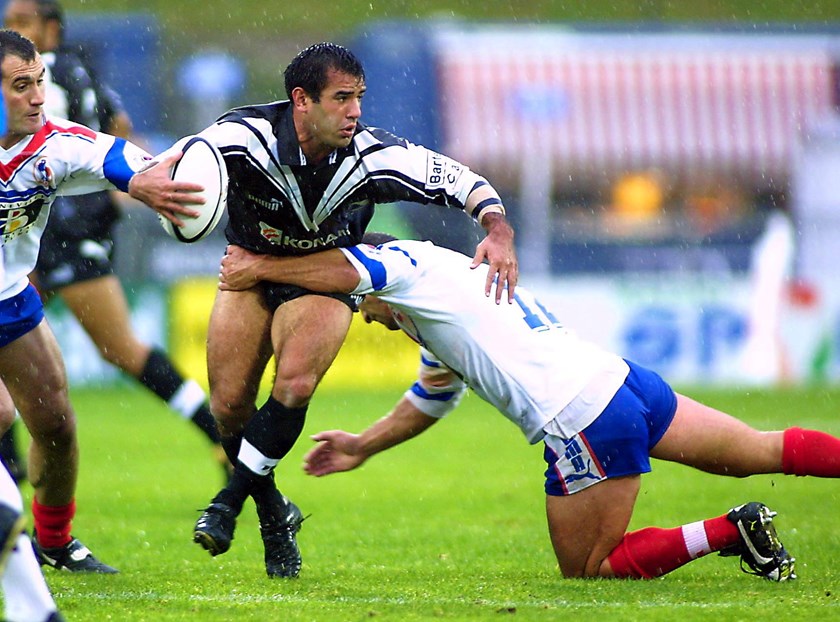
Who was the best player you played with or against?
You always felt better when you knew Stacey Jones was in the shed with you. There were countless times I saw Stacey pull back a game that was lost or gone.
Stacey and I shared a lot of things on the field and off the field, and the fact that everyone wanted to sign him but he wanted to stay at the club for less makes him one of the greatest.
Of the players I played against, there was nothing Andrew Johns couldn’t do but to debut against Brad Fittler and then getting his last Test jumper when I used to try him at lunchtime was pretty special. He was No.13 for Australia and I was No.13 for the Kiwis so I swapped jumpers with him.
Who was the toughest opponent?
Gorden Tallis could do it all. He could lead, he could intimidate, he could score tries, he could put a big shot on. He was tough, he would roll up his sleeves and do whatever he needed to do, he would put a shot on, he would take a hard run, he would spray his team. That sort of stuff is pretty cool.
I thought Paul Gallen wanted to have a go and then he decided he didn’t want to fight
Monty Betham on Paul Gallen
What are you doing with yourself now that your sporting career is over?
"We co-founded a global design innovation company called Indigo and there are two platforms we have started – Manaaki and Chooice. Manaaki is a platform that helps business owners navigate through COVID-19 and we have had government support and all sorts of people partnering with us.
Chooice.co.nz is an online e-commerce platform that helps small stores and businesses here. We are just trying to help more revenue to stay in this country.
When you are playing you think that nothing can rival the highs of sport but what you learn as an athlete - your work ethic and being a great student - really helps you, plus the people skills which are essential. You can have those highs two or three times a week and you can do it longer than for a 10-year career.

